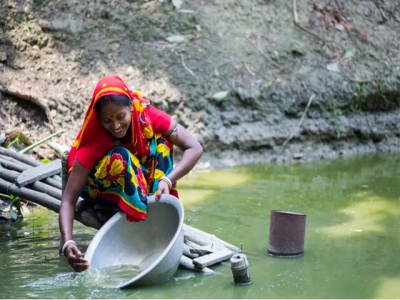A small fish with big implications

An endangered and nutrient-rich fish that was once a staple food in Bangladesh is poised to make a comeback in aquaculture, following a successful new breeding project.
Small fish species provide key nutrients to millions of people in Bangladesh, as well as supporting many livelihoods. Photo: WorldFish
Bangladesh’s Fisheries Research Institute at Santahar in Bogra have reported this week that they have managed to artificially breed batasi (Neotropius atherinoides) for the first time.
The project was undertaken by scientists at the Flood VM epicentre, led by Dr David Rentu Das, who predicts that it will pave the way for widespread aquaculture of the species, and considerable health benefits for the country’s growing population.
"This fish is rich in nutrients," he is quoted as saying in The New Nation. “Each 100 grams of edible fish contains 610 milligrams of potassium, 400 milligrams of calcium, 200 milligrams of magnesium, 200 milligrams of manganese, 33 milligrams of iron and 14 milligrams of zinc. And zinc helps to increase immunity.”
The New Nation also reports that the institute is currently working on breeding programmes for 14 of the 64 most endangered small fish species in the country.
Related news
 Glasses aid farmer's fish welfare vision
Glasses aid farmer's fish welfare vision Greig Seafood has decided to start regularly using high tech “Smart Glasses” as a way to improve fish health and welfare, following a successful trial.
 Bringing autonomous fish farms one step closer
Bringing autonomous fish farms one step closer Plans to develop the technology to allow for fish farms to be operated remotely, with monitoring and repair controlled by personnel based on land
 Can zebrafish help humans reach Mars?
Can zebrafish help humans reach Mars? A recent project involving zebrafish, led by researchers at Queens University Belfast, is looking to understand how a form of reduced metabolic activity may